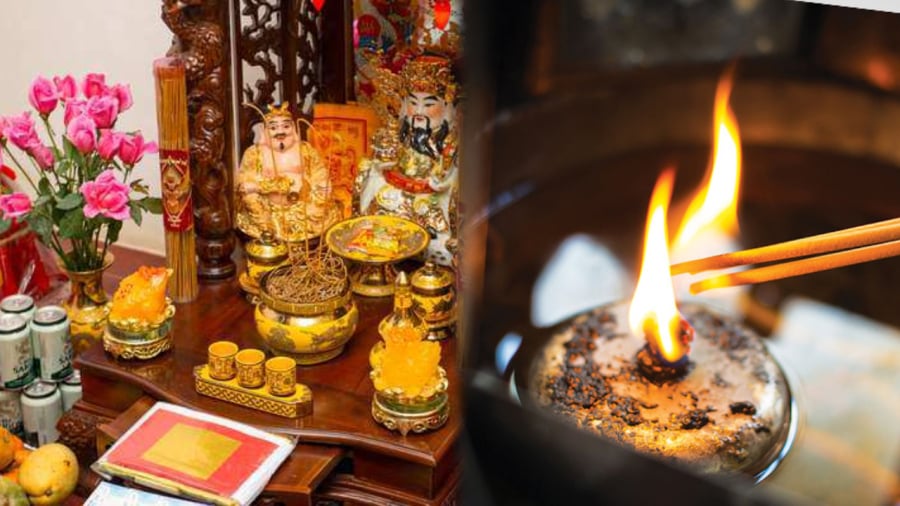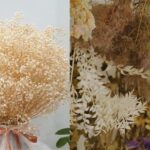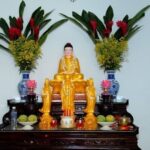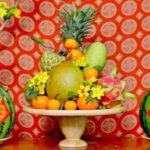3 Types of Flowers to Avoid Placing on the Ancestral Altar on the 1st Day
- Artificial Flowers
Nowadays, there is a wide variety of artificial flowers available in the market, such as wax, silk, and plastic flowers. These flowers are crafted to look very lifelike, with vibrant colors and realistic shapes. However, artificial flowers are considered inappropriate for ancestral altars.
Placing artificial flowers on the altar demonstrates a lack of sincerity and dedication to the worship of deities and ancestors. Ancestral worship does not require extravagance or complexity; instead, it demands earnestness and reverence. Artificial flowers may have visual appeal, but they lack fragrance and wholesomeness, failing to bring positive energy to the worship space.
- Flowers with Unpleasant or Overpowering Scents
Flowers intended for the ancestral altar should be fresh and vibrant, with a gentle and pleasing fragrance. Strongly scented flowers, such as those with a pungent or foul odor, are not suitable as they can disrupt the solemn atmosphere of the worship space and cause discomfort.
Opt for flowers like red roses, snapdragons, or local lilies for the 1st day of the lunar month, full moon days, and festive occasions.
- Flowers with Inauspicious Meanings
While many flowers boast beautiful appearances and vibrant hues, not all carry auspicious meanings. Some flowers, like jasmine, are best avoided for ancestral altars despite their delicate fragrance and graceful beauty.
In daily life, jasmine is commonly used for tea infusions and cooking. However, when it comes to worship, jasmine is often associated with intricate romantic entanglements and is therefore deemed inappropriate for the solemn and sacred setting of ancestral altars.

4 Types of Fruits to Avoid Placing on the Ancestral Altar on the 1st Day
- Artificial Fruits
Similar to artificial flowers, artificial fruits are also considered disrespectful and inappropriate for ancestral altars. Some people believe that deities and ancestors only “consume the essence” of the offerings, so they opt for artificial fruits that look aesthetically pleasing and are more cost-effective. However, using artificial fruits indicates a lack of reverence and sincerity, implying deception and disrespect towards one’s ancestors. Including artificial flowers and fruits in worship practices may negatively impact the family’s fortune and relationships.
- Fruits with Overpowering Scents
When offering incense, choose fruits with subtle and pleasant aromas. Avoid strongly scented fruits like durian and jackfruit, as their intense fragrances can disrupt the serene and sacred atmosphere of the worship space.
Opt for auspicious fruits with gentle fragrances, such as pomelos, Buddha’s hands, mangoes, or bananas, to place on the ancestral altar.
- Overripe Fruits
Overripe fruits tend to spoil quickly, especially when placed on the altar, which is often warm due to burning incense and lamps. Rotten fruit carries negative connotations and can impact the family’s fortune. Moreover, such fruits may attract insects, disrupting the sanctity and cleanliness of the worship space.
- Fruits with Inauspicious Meanings
Fruits with sharp spines, such as durian and jackfruit, and those with bitter, sour, or astringent tastes, like chilies, sour star gooseberries, and bitter melons, are considered inauspicious and should be avoided. Sharp spines symbolically affect the family’s harmony, while bitter, sour, and astringent tastes can influence the family’s fortune and smooth sailing.
The aforementioned three types of flowers and four types of fruits are best avoided when offering respects at the ancestral altar on the 1st day of the lunar month, full moon days, and other festive occasions throughout the year.
The Vase That Brings Misfortune: Unveiling the Ancient Secret.
Introducing the ancient wisdom of feng shui, a practice that has long been associated with bringing harmony and balance to one’s home. According to this age-old philosophy, certain types of vases can have a detrimental effect on the energy flow of a space, potentially bringing bad luck to its inhabitants.



































